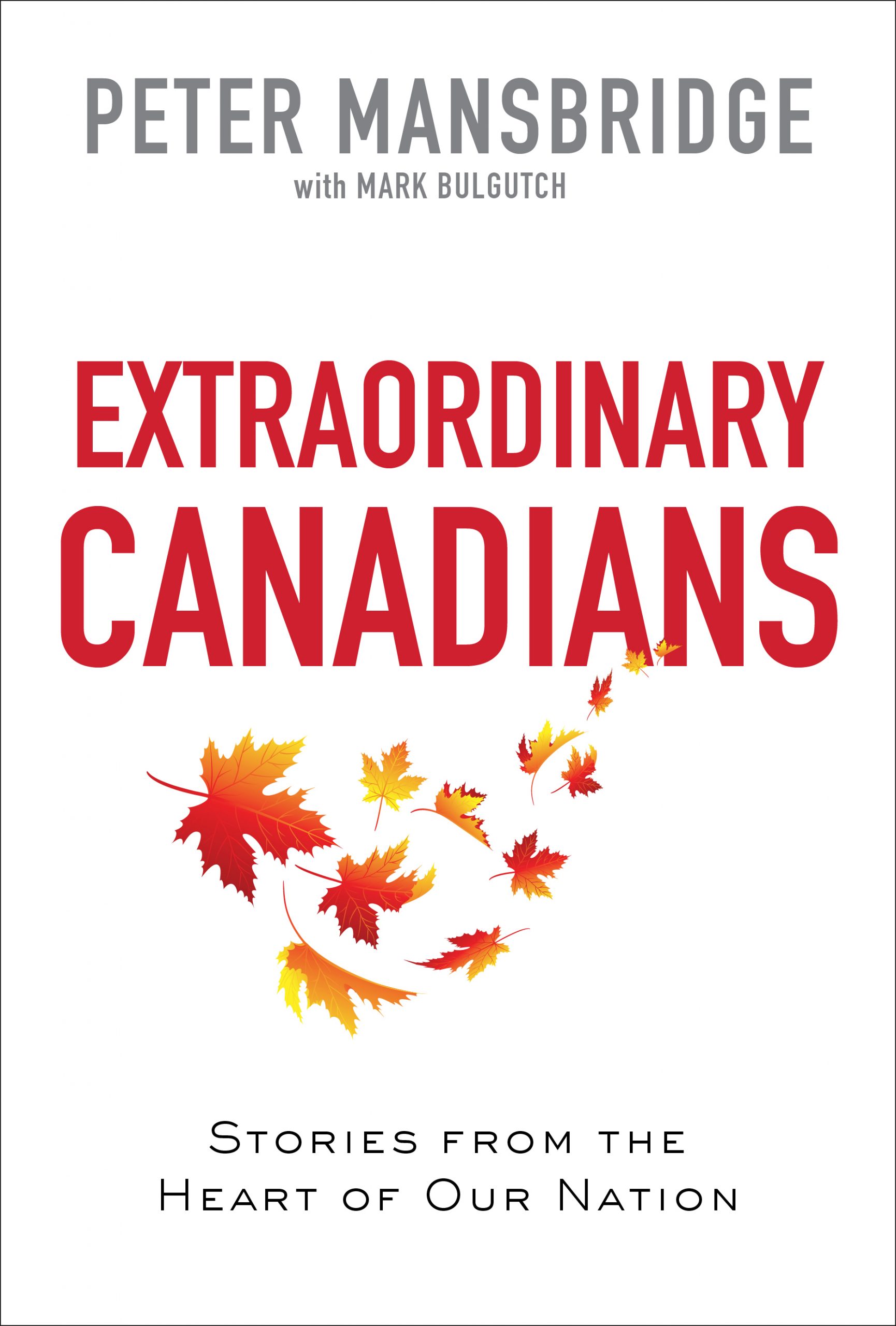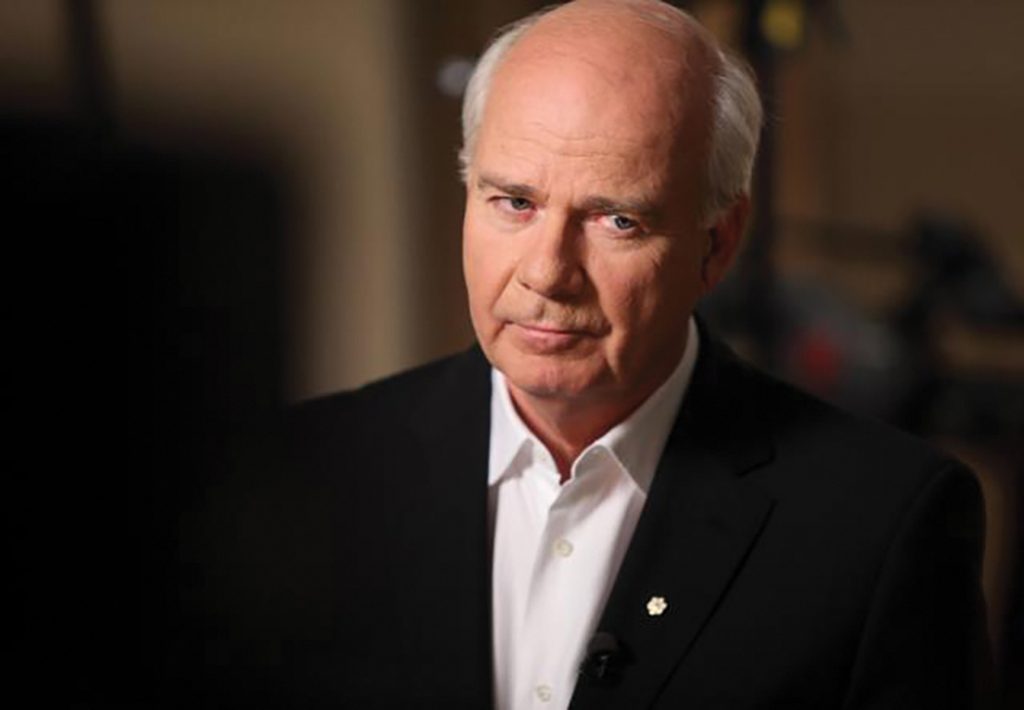A Journey of the Heart

Extraordinary Canadians: Stories from the Heart of our Nation
Simon & Schuster, 2020
By Peter Mansbridge with Mark Bulgutch
Review by Anthony Wilson-Smith
November-December issue of Policy
Peter Mansbridge is one of Canada’s best-known figures—not only of this but of any era. He earned that distinction over half a century as one of the country’s leading journalists, including during more than three decades as anchor of CBC’s The National, until he stepped away on Canada Day in 2017.
By then, he had spoken nightly to generations of Canadians, won every major award in his craft (and, alongside those honours, was cast affectionately in Disney’s full-length 2016 animated feature, Zootopia, as the voice of the character “Peter Moosebridge”.)
Those distinctions make it easy to overlook the flipside of that equation: few Canadians know this country and its people better than Peter, who began his career as a fill-in radio announcer in Churchill, Manitoba. In “retirement”, that hasn’t changed: he’s still out there engaging with people daily via his podcast, documentaries for the CBC, frequent speeches, writing and charity work (which includes the very active role he plays as a member of the Board of Directors of my organization, Historica Canada.)
His favourite subjects, by his own admission, aren’t traditional newsmakers, but instead the so-called “ordinary” Canadians that he met by the thousands as he criss-crossed the country. As his new book Extraordinary Canadians: Stories from the Heart of Our Nation makes clear, he hasn’t lost his enthusiasm for seeking out little-known but remarkable people whose exploits deserve to be told. Co-authored with friend and long-time producer Mark Bulgutch, the book looks at the lives and achievements of 17 Canadians, each of whom describes in first-person form how they have met and overcome exceptional personal challenges for the betterment of many.
The sweep and scope of those people and what they have done is startling at times. The most breathtaking chapter—which will surely get the most attention—is that of “Levon Johnson”, the pseudonym for a warrant officer in Canada’s elite and shadowy-by-design Joint Task Force (JTF) commandos.
His account of taking part in a night raid against a large force of Taliban warriors during the conflict in Afghanistan is unlike anything Canadians will have heard of our modern-day forces. The reason: the identities of the soldiers and their activities are so secret that even prime ministers are not always privy to detailed information. It’s a measure of the degree of trust in which Peter is held that he was given this access—and also the result of more than 20 years of trying to do so.
While the other stories are less dramatic by comparison, they’re no less moving in different ways. To Canadians who follow the news closely, some protagonists will be familiar, including Indigenous activist Cindy Blackstock and long-time military chaplain Rabbi Reuven Bulka, a fixture at Remembrance Day services in Ottawa for many years.
Others are less known outside their communities or home provinces but their influence, like the stones tossed in water famously described by the late Robert Kennedy, ripples far beyond. Manitoba’s Robb Nash overcame brain injuries in a car crash that almost killed him—and after battling depression in the aftermath, now devotes his life to dealing with troubled teens considering suicide. Susan Rose grew up in small town Newfoundland as a lesbian painfully aware first-hand of discrimination against LGBTQ people, so she led a long and successful fight to increase understanding and acceptance within schools and the broader community.

One of the book’s many strengths is the way the authors let their subjects discuss their achievements within the full context of their lives, alongside failures, frustrations and disappointments of all sorts. The achievements are diverse in nature, but share a theme: they found their strength, and calling, in fighting conditions that initially seemed insurmountable.
This is a reporters’ book; the authors deliberately subverted their own voices to let their subjects speak for themselves. (Bulgutch, now retired but long one of the CBC’s most senior news executives, was known among colleagues for his almost preternatural calm in breaking-news situations, and for his insistence that “the story must always come first.”)
The range and diversity of the subjects is a tribute to their legwork—and the composition and diversity of this country. The hardships and discrimination some of the subjects face remind us of two valuable lessons: we still have a lot of work to do to make Canada a comfortable place for all, and we have some remarkable people among us who are prepared to take on that work.
All of which reminds us of a part of Peter’s own background that many Canadians don’t know, or have forgotten. In 1987, he was wooed by CBS News President Howard Stringer to move to New York to anchor the network’s morning show. Implicit in that offer was the likelihood that if it worked well, he would take over the nightly news at a time when network anchors earned $10-15 million (US) a year and had average audiences of some 20 million viewers a night. The CBC’s then-anchor, Knowlton Nash, offered to step aside to give Peter the job if he would stay here. He accepted, at a salary enviable to most Canadians, but less than 10 per cent of what he might have made in New York.
Thirty-three years later, we have this book. It is in essence a love letter to his country. It helps explain what matters to him, and why he stayed. And why, at such a difficult time not only in Canada but around the world, “ordinary” people are the ones who ultimately bring us hope.
Contributing Writer Anthony Wilson-Smith, President and CEO of Historica Canada, is a former Editor-in-Chief of Maclean’s.
